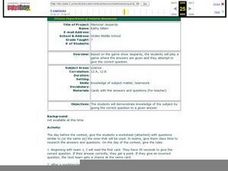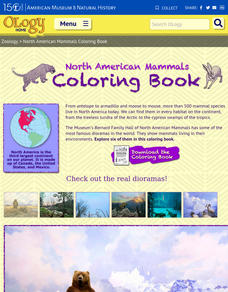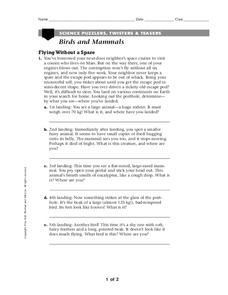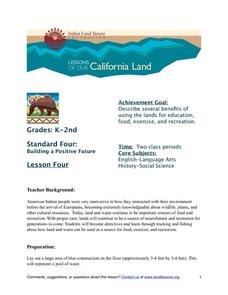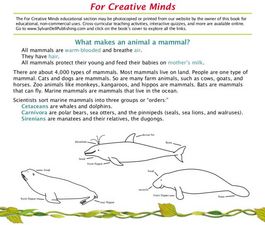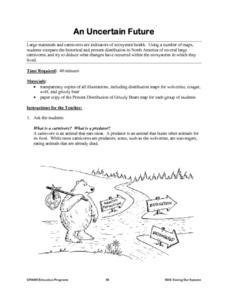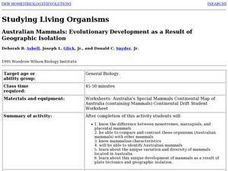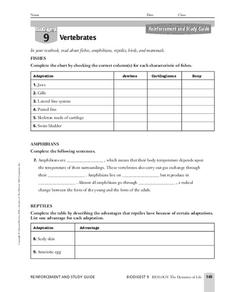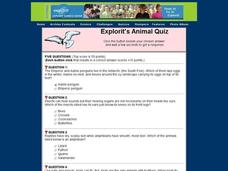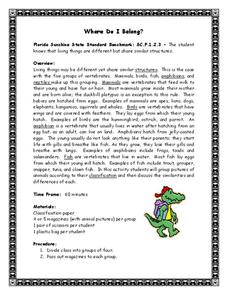Biology Junction
Mammals
Mammals include more than 4,000 species and represent the most dominant land animals on Earth. Scholars learn about the large variety of mammals, including orders unfamiliar to most. The presentation highlights the characteristics and...
American Museum of Natural History
Moving Mammals
How many different ways do mammals move from place to place? An online resource uses animation to show how different mammals move. Learners use a slider to speed up or slow down a variety of mammals. The versatile lesson works as a...
Curated OER
Mammal Jeopardy
Seventh graders play a jeopardy like game using information about mammals. Before beginning the game, they complete a worksheet with questions similar to ones that are to be used during the competition. They answer more difficult...
American Museum of Natural History
North American Mammals Coloring Book
Seven pages offer scholars the opportunity to learn about North American mammals and boost their coloring skills. Animals include brown bears, beavers, jackrabbits, wolves, jaguar, and Dall sheep
Curated OER
Get- To Know Mammals
Students take a field trip and record information about mammals. In this mammals instructional activity, students hunt for tracks, waste, or other evidence that a mammal exists in this habitat. Students complete a worksheet on the...
Curated OER
Birds and Mammals
In this science worksheet, students create details given an imaginary story to reinforce the topics of mammals and birds. The second page has more puzzles for them to do.
Curated OER
Australian Mammals: Evolutionary Development as a Result of Geographic Isolation
Students comprehend the difference between monotremes, marsupials, and placental mammals. They are able to compare and contrast these organisms (Australian mammals) with other mammals. Students are able to identify Australian mammals.
Curated OER
Environment: Endangered Mammal Project
Students research different mammals and create illustrations and narratives about them. Working individually or in small groups, students compose their rough drafts prior to creating their posters or dioramas. Students present short...
Indian Land Tenure Foundation
Gifts from Land and Water
With a series of fun hands-on simulations, young children can learn about conservation and natural resources. Your learners become land detectives, discussing and investigating the gifts that the land and water provide them. They then...
Curated OER
Mammals
Learners examine the characteristics of mammals through video clips, and slide shows. Lesson includes clips of fastest land animal, biggest mammal, loudest mammal and tallest animal.
Curated OER
For Creative Minds: What Makes an Animal a Mammal?
Students read about categories of mammals and their features. Students then construct a marine animal, using given print outs in the lesson. Students then create adaptations for their mammal, using a web site reference for guidance.
Curated OER
An Uncertain Future
Students study the distribution of large mammals and carnivores in an ecosystem. Using maps and historical data, they examine areas for these animals such as refuges, untouched forests, prairies and grasslands. Students determine actions...
Curated OER
Life Science Animal Worksheet: Mammals
For this animal classification practice worksheet, students examine the 6 pictured animals and identify the animals that are mammals.
Curated OER
Classification and Adaptations- Streams, Rivers, and Lakes - Where the Land Meets the Sea And Caribbean Reef
In this science worksheet set, students answer 14 short answer questions about the classification and adaptation of life in streams, rivers, and lakes. They also answer 15 questions about life "Where the Land Meets the Sea" and in a...
Curated OER
Australian Mammals: Evolultionary Development as a Result of Geographic Isolation
Learners examine the differences between monotremes, marsupials, and placental mammals and are able to contrast these organisms with other mammals. They learn about unique variation and the diversity of mammals located in Australia.
Curated OER
The Diversity of Mammals
In this mammals learning exercise, students use idea maps about monotremes, marsupials, and placental mammals to complete 3 short answer questions.
Curated OER
Sunken Millions Animals
This PowerPoint includes a game with ocean graphics in which two teams answer increasingly difficult questions about animals. Topics covered include plant and animal cells, animal adaptation, and similarities and differences between...
Curated OER
Vertebrates
In this vertebrate activity, learners review the different adaptations for the 5 groups of vertebrates: birds, mammals, reptiles, amphibians, and fishes. This activity has 12 matching, 1 fill in the blank, and 7 short answer questions.
Curated OER
Mammals of Wisconsin
Students explore the exciting world of mammals as they learn the identities of some Wisconsin native residents. They examine their adaptations and learn how they survive in a state with a wide array of temperatures and ecosystems.
Curated OER
Explorit's Animal Quiz
In this animals worksheet, students complete a five question multiple choice on-line interactive quiz about animals. This quiz has questions about mammals, insects and birds.
Curated OER
Cloze Passage: Mammals in the Sea
In this mammals in the sea cloze procedure worksheet, learners fill in the 12 missing words in the passage to help identify their reading level.
Curated OER
What is the Evidence for Evolution?
Learners identify one object that would tell the story of their lives. In groups, they determine what can and cannot be told from objects left behind. After watching a video, they compare and contrast chicken bones to human bones. To...
Curated OER
Where Do I Belong?
Fourth graders work in groups. They are given magazines. Students cut pictures of five mamals, five birds, five reptiles, five amphibians, and five fish. They place the pictures in a plastic bag. Students switch bags. They are explained...
Curated OER
Life Has A History
In this biology worksheet, students identify and match various classes of species found today. Then they explain why biodiversity exists today on earth and define evolution. Students also describe who a paleontologist is and what they do.




